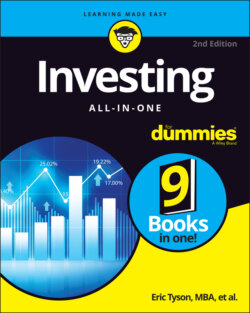Читать книгу Investing All-in-One For Dummies - Eric Tyson - Страница 111
Savings accounts and certificates of deposit
ОглавлениеBanks generally pay higher interest rates on savings account balances than they do on checking account balances. But they have often lagged behind the best money market funds, offered by mutual fund companies and brokerage firms. Online banking is changing that dynamic, however, and now the best banks offer competitive rates on savings accounts.
The virtue of most savings accounts is that you can earn some interest yet have penalty-free access to your money. The investment won’t fluctuate in value the way that a bond will, and you don’t have early-withdrawal penalties, as you do with a certificate of deposit (CD).
The yield on bank savings accounts is generally pretty crummy. That’s why your friendly neighborhood banker will be quick to suggest a CD as a higher-yielding investment alternative to a bank savings account. They may tout the fact that unlike a bond, a CD doesn’t have fluctuating principal value. CDs also give you the peace of mind afforded by the government’s FDIC insurance program.
CDs pay higher interest rates than savings accounts because you commit to tie up your money for a period of time, such as six or twelve months, or three or five years. The bank pays you, say, 2 percent and then turns around and lends your money to others through credit cards, auto loans, and so on. The bank often charges those borrowers an interest rate of 10 percent or more. Not a bad business!
Some investors (typically older ones who are worried about risk) use CDs by default without researching their pros and cons. Here are some drawbacks that your banker may neglect to mention:
Early-withdrawal penalties: When you tie up your money in a CD and later decide you want it back before the CD matures, a hefty penalty (typically, about six months’ interest) is usually shaved from your return. With other lending investments, such as bonds and bond mutual funds, you can access your money without penalty and generally at little or no cost.
Mediocre yields: In addition to carrying penalties for early withdrawal, a CD yields less than a high-quality bond with a comparable maturity (such as two, five, or ten years). Often, the yield difference is 1 percent or more, especially if you don’t shop around and simply buy CDs from the local bank where you keep your checking account.
Only one tax flavor: High-tax-bracket investors who purchase CDs outside their retirement accounts should be aware of a final and perhaps fatal flaw of CDs: The interest on CDs is fully taxable at the federal and state levels. Bonds, by contrast, are available in tax-free (federal and/or state) versions, if you desire.
You can earn higher returns and have better access to your money when it’s in bonds and bond funds than you can when it’s in CDs. Bonds make especially good sense when you’re in a higher tax bracket and would benefit from tax-free income in a nonretirement account. CDs may make sense when you know, for example, that you can invest your money for, say, two years, after which time you need the money for some purchase that you expect to make. Just make sure you shop around to get the best interest rate from an FDIC-insured bank. If having that U.S. government insurance gives you peace of mind, consider investing in Treasury bonds, which tend to pay more interest than many CDs.
